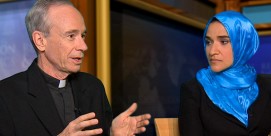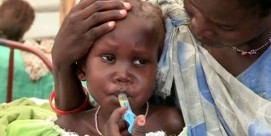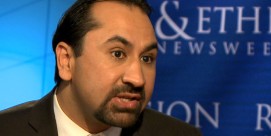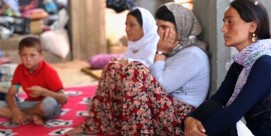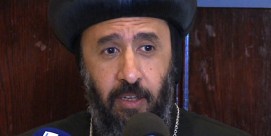In This Episode << SLIDE LEFT TO SEE ADDITIONAL SEGMENTS
Muslims and Charity Interview Daniel Glaser
Read more of Kim Lawton’s interview about Muslim charities with Daniel Glaser, deputy assistant secretary for terrorist financing and financial crimes at the U.S. Treasury Department:
Q: What is the U.S. government’s policy on investigating whether a charity has been helping to fund terrorist activities?
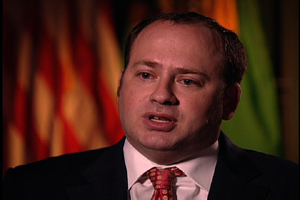 A: The U.S. government’s policy is that we want to do everything we can to accomplish two things to promote charitable giving as much as possible. We all know that the American people are an extremely generous group, and we do everything we can to promote that sector. One of the aspects of promoting charitable giving is to empower the donors by ensuring that when donors give to a charity that it arrives at the end destination in the form of charitable donations. Part of that is to ensure that the sector is not abused by terrorist financing. So when we have information in the U.S. government, however we come about the information, that a particular charity is engaged in terrorist financing, we will investigate that and we will decide the appropriate steps to take, be it an action by the Treasury Department, be it an action by the Justice Department, be it by other forms of communication.
A: The U.S. government’s policy is that we want to do everything we can to accomplish two things to promote charitable giving as much as possible. We all know that the American people are an extremely generous group, and we do everything we can to promote that sector. One of the aspects of promoting charitable giving is to empower the donors by ensuring that when donors give to a charity that it arrives at the end destination in the form of charitable donations. Part of that is to ensure that the sector is not abused by terrorist financing. So when we have information in the U.S. government, however we come about the information, that a particular charity is engaged in terrorist financing, we will investigate that and we will decide the appropriate steps to take, be it an action by the Treasury Department, be it an action by the Justice Department, be it by other forms of communication.
Q: What are some of the situations that violate the law or are troubling? What have you found?
A: Unfortunately, we have uncovered a number of charities that have been engaged in terrorist financing for a range of terrorist organizations, organizations such as Hamas, organizations such as Al-Qaeda, organizations such as Hezbollah. And in these cases these organizations are quite frankly taking advantage of the impulses of the American Muslim community. They are soliciting donations, and they are knowingly taking these donations and putting them to nefarious purposes.
Q: How widespread do you think this is?
A: I don’t think it is widespread, to the extent that there [are] over a million charities in the U.S., and we have designated six charities. That is a very small percentage. I think by and large the American charitable community and the American Muslim charitable community are law abiding and want to in fact ensure that their charitable giving arrives in the form of charitable donations. On the other hand, the fact of the matter is that charities are uniquely suited to advance the ends of terrorist organizations if they choose to exploit them. They deal in raising money and moving across boarders often; they often deal in cash; they have perfectly legitimate reasons to be in conflict regions and post-disaster regions. So for a terrorist organization they provide a fantastic opportunity to take advantage of. And if you look at the total universe of entities that we at the Treasury Department designate as being designated terrorist financiers, almost 15% are charitable organizations or offices or officials of those charitable organizations, which is a fairly substantial percentage. So as far as overall numbers go, it is a very small percentage of the charitable community; it is a very significant percentage of the individuals and entities that are in fact moving money for terrorist organizations.
Q: How do you determine whether those leaders are using the money for nefarious purposes?
A: Unfortunately some of these organizations aren’t particularly–the organizations such as Hamas, Hezbollah and al-Qaeda–they are not hiding what they are doing. They are terrorist organizations. They are committed to engaging in violence to achieve political goals, so it is pretty clear what those organizations are involved in. And through any number of methods, through intelligence, through law enforcement, thorough open-source research, it becomes clear from time to time that a particular organization is affiliated with these terrorist organizations, and then we look further into it, and we take it from there.
Q: Some people are worried that this individual donor gives money, and he or she may have other connections that the organizations are not aware of, or they have connections to someone who has connections to someone. How direct does the link need to be?
A: It is certainly not the intention of the Treasury Department or the U.S. government to be targeting individual donors here in the United States, and we haven’t. If you look at the designations that we made, they have been on the charities themselves. They are been on the officers of the charities. People who are unwittingly giving to charities are the victims of these terrorist organizations, of these officials who are trying to mislead them and trying to exploit their charitable impulses. So what we focus on are the parties, are the individuals, are the entities who are actively engaged in this type of activity.
Q: Some American Muslims have expressed concerns that they feel the U.S. government is unfairly targeting them, that there is an agenda to shut down all Muslim charities. How do you answer those perceptions in the Muslim community?
A: It’s a great challenge that we face. I mean, the easy answer is of course we are not targeting Muslim charities as a whole. We have designated six Muslim charities here in the United States; there are many more than that. It’s not our agenda to shut down all Muslim charities and the challenge for us is to work with the Muslim-American community and to work with the charitable community to empower them to make sure that they have the information they need, to make sure that they are engaging in the preventive measures that they could be engaging in to protect themselves. It is not the U.S. government that is targeting Muslim charities. Unfortunately, it is the terrorist organizations that are targeting Muslim charities. They are targeting them to exploit them, they are targeting them to take what is, like I said before, a very noble charitable impulse of the American-Muslim community and distort that and pervert it.
Q: To what extent is the U.S. government working with the Muslim community to try to come up with partnerships and understandings in these areas?
A: We try to be as active as we can. From the Department of the Treasury’s perspective, we have issued charitable guidelines that we have drafted in consultation with the chartable community, including the Muslim-American charitable community. These guidelines are voluntary guidelines. They are intended to provide information to these charities to explain to them, from our view, what we think they should be focusing on, in a risk-based approach to protect themselves from those who seek to exploit them.
Q: What message would you have for American Muslims who feel an obligation to give, to donate, to help others as they consider donating to charitable organizations?
A: My message is that it’s a completely understandable and legitimate impulse, the charitable impulse, and it is one that we want to encourage, and it is something we would like to work [on] with the American-Muslim community and the charitable community in order to provide them what we call a safe giving space, so that they know that when they give their money to a charity that it is going to wind up at its intended destination. So from our perspective the key is to make sure that the donor is asking the right questions of the charity that the donor is dealing with. Does the charity implement the voluntary Treasury guidelines that we put out? Does the charity take steps that it needs to take in order to protect itself from abuse, in order to ensure that it is monitoring the disbursement of its funds, that it is taking a good accounting of the funds? And then, from the perspective of our relationship with the charities, we want to make sure charities have the information they need in order to apply these types of protective measures. [Treasury Department] designations have a number of purposes. Obviously the primary purpose of a designation is to prevent the flow of terrorist financing funds. But another purpose of a designation is to educate the community at large to let them know that this particular charity is a charity they need to beware of and need to avoid, so that as a donor decides which charity do I want to give to, they will at least know that certain charities are off limits to them. There are many other charities for them to choose from. And the important step for a donor to take in that case, again, is to ask questions of that charity. Does it implement the Treasury guidelines? Does it take preventive measures? Does it have accounting procedures and other vetting procedures in place to insulate itself from abuse from terrorist organizations? Again, with respect to the charities themselves, we need to be communicating with the charities themselves [to] make sure they have the information they need to protect themselves, both in terms of typologies–how do terrorist organizations operate? how do terrorist organizations abuse charities?–and in terms of preventive practices they can take, which are encapsulated in the Treasury Department charitable guidelines. Read more of Kim Lawton’s interview about Muslim charities with Daniel Glaser, deputy assistant secretary for terrorist financing and financial crimes at the U.S. Treasury Department:
Q: What is the U.S. government’s policy on investigating whether a charity has been helping to fund terrorist activities?
A: The U.S. government’s policy is that we want to do everything we can to accomplish two things to promote charitable giving as much as possible. We all know that the American people are an extremely generous group, and we do everything we can to promote that sector. One of the aspects of promoting charitable giving is to empower the donors by ensuring that when donors give to a charity that it arrives at the end destination in the form of charitable donations. Part of that is to ensure that the sector is not abused by terrorist financing. So when we have information in the U.S. government, however we come about the information, that a particular charity is engaged in terrorist financing, we will investigate that and we will decide the appropriate steps to take, be it an action by the Treasury Department, be it an action by the Justice Department, be it by other forms of communication.
Q: What are some of the situations that violate the law or are troubling? What have you found?
A: Unfortunately, we have uncovered a number of charities that have been engaged in terrorist financing for a range of terrorist organizations, organizations such as Hamas, organizations such as Al-Qaeda, organizations such as Hezbollah. And in these cases these organizations are quite frankly taking advantage of the impulses of the American Muslim community. They are soliciting donations, and they are knowingly taking these donations and putting them to nefarious purposes.
Q: How widespread do you think this is?
A: I don’t think it is widespread, to the extent that there [are] over a million charities in the U.S., and we have designated six charities. That is a very small percentage. I think by and large the American charitable community and the American Muslim charitable community are law abiding and want to in fact ensure that their charitable giving arrives in the form of charitable donations. On the other hand, the fact of the matter is that charities are uniquely suited to advance the ends of terrorist organizations if they choose to exploit them. They deal in raising money and moving across boarders often; they often deal in cash; they have perfectly legitimate reasons to be in conflict regions and post-disaster regions. So for a terrorist organization they provide a fantastic opportunity to take advantage of. And if you look at the total universe of entities that we at the Treasury Department designate as being designated terrorist financiers, almost 15% are charitable organizations or offices or officials of those charitable organizations, which is a fairly substantial percentage. So as far as overall numbers go, it is a very small percentage of the charitable community; it is a very significant percentage of the individuals and entities that are in fact moving money for terrorist organizations.
Q: How do you determine whether those leaders are using the money for nefarious purposes?
A: Unfortunately some of these organizations aren’t particularly–the organizations such as Hamas, Hezbollah and al-Qaeda–they are not hiding what they are doing. They are terrorist organizations. They are committed to engaging in violence to achieve political goals, so it is pretty clear what those organizations are involved in. And through any number of methods, through intelligence, through law enforcement, thorough open-source research, it becomes clear from time to time that a particular organization is affiliated with these terrorist organizations, and then we look further into it, and we take it from there.
Q: Some people are worried that this individual donor gives money, and he or she may have other connections that the organizations are not aware of, or they have connections to someone who has connections to someone. How direct does the link need to be?
A: It is certainly not the intention of the Treasury Department or the U.S. government to be targeting individual donors here in the United States, and we haven’t. If you look at the designations that we made, they have been on the charities themselves. They are been on the officers of the charities. People who are unwittingly giving to charities are the victims of these terrorist organizations, of these officials who are trying to mislead them and trying to exploit their charitable impulses. So what we focus on are the parties, are the individuals, are the entities who are actively engaged in this type of activity.
Q: Some American Muslims have expressed concerns that they feel the U.S. government is unfairly targeting them, that there is an agenda to shut down all Muslim charities. How do you answer those perceptions in the Muslim community?
A: It’s a great challenge that we face. I mean, the easy answer is of course we are not targeting Muslim charities as a whole. We have designated six Muslim charities here in the United States; there are many more than that. It’s not our agenda to shut down all Muslim charities and the challenge for us is to work with the Muslim-American community and to work with the charitable community to empower them to make sure that they have the information they need, to make sure that they are engaging in the preventive measures that they could be engaging in to protect themselves. It is not the U.S. government that is targeting Muslim charities. Unfortunately, it is the terrorist organizations that are targeting Muslim charities. They are targeting them to exploit them, they are targeting them to take what is, like I said before, a very noble charitable impulse of the American-Muslim community and distort that and pervert it.
Q: To what extent is the U.S. government working with the Muslim community to try to come up with partnerships and understandings in these areas?
A: We try to be as active as we can. From the Department of the Treasury’s perspective, we have issued charitable guidelines that we have drafted in consultation with the chartable community, including the Muslim-American charitable community. These guidelines are voluntary guidelines. They are intended to provide information to these charities to explain to them, from our view, what we think they should be focusing on, in a risk-based approach to protect themselves from those who seek to exploit them.
Q: What message would you have for American Muslims who feel an obligation to give, to donate, to help others as they consider donating to charitable organizations?
A: My message is that it’s a completely understandable and legitimate impulse, the charitable impulse, and it is one that we want to encourage, and it is something we would like to work [on] with the American-Muslim community and the charitable community in order to provide them what we call a safe giving space, so that they know that when they give their money to a charity that it is going to wind up at its intended destination. So from our perspective the key is to make sure that the donor is asking the right questions of the charity that the donor is dealing with. Does the charity implement the voluntary Treasury guidelines that we put out? Does the charity take steps that it needs to take in order to protect itself from abuse, in order to ensure that it is monitoring the disbursement of its funds, that it is taking a good accounting of the funds? And then, from the perspective of our relationship with the charities, we want to make sure charities have the information they need in order to apply these types of protective measures. [Treasury Department] designations have a number of purposes. Obviously the primary purpose of a designation is to prevent the flow of terrorist financing funds. But another purpose of a designation is to educate the community at large to let them know that this particular charity is a charity they need to beware of and need to avoid, so that as a donor decides which charity do I want to give to, they will at least know that certain charities are off limits to them. There are many other charities for them to choose from. And the important step for a donor to take in that case, again, is to ask questions of that charity. Does it implement the Treasury guidelines? Does it take preventive measures? Does it have accounting procedures and other vetting procedures in place to insulate itself from abuse from terrorist organizations? Again, with respect to the charities themselves, we need to be communicating with the charities themselves [to] make sure they have the information they need to protect themselves, both in terms of typologies–how do terrorist organizations operate? how do terrorist organizations abuse charities?–and in terms of preventive practices they can take, which are encapsulated in the Treasury Department charitable guidelines.

